Key takeaways:
- Military history research connects personal experiences with the broader narrative of service and sacrifice, enriching our understanding of ancestry.
- Accessing military records reveals emotional stories behind the facts, fostering family discussions and a deeper appreciation of shared history.
- Conducting interviews with family members adds unique, personal anecdotes that can illuminate historical contexts and familial relationships.
- Sharing findings through family gatherings or digital presentations reinforces connections, transforming historical data into emotional legacies for future generations.
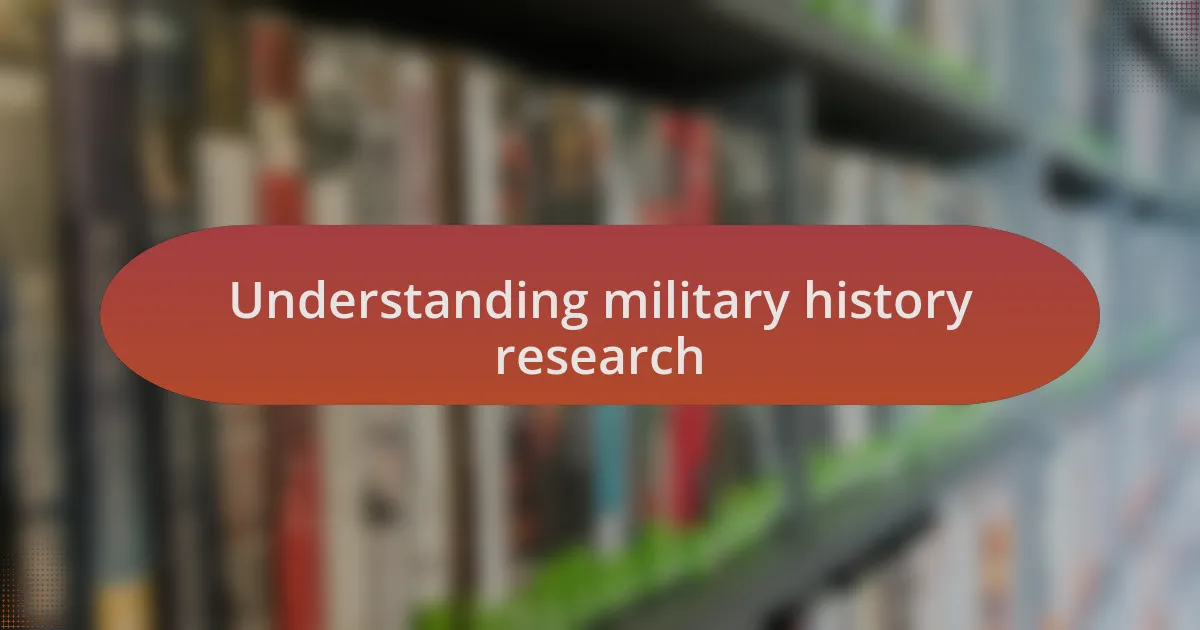
Understanding military history research
Understanding military history research involves delving into a vast array of documents and records that often tell compelling stories of service and sacrifice. When I first explored my family’s military past, I was struck by how these records not only listed dates and ranks but also revealed personal experiences, from letters written on the battlefield to accounts of bravery during pivotal moments. Isn’t it fascinating how a meticulous search can connect us to the emotions our ancestors felt in times of conflict?
One of the challenges I faced was navigating the different types of military records available. For instance, I discovered census data, service records, and pension files, each providing a unique glimpse into the lives of family members who served. It was like piecing together a puzzle, where each document added depth to my understanding of their experiences. Have you ever stumbled upon a record that changed how you viewed a family member? That sudden realization can be incredibly emotional, often making history feel personal and alive.
As I dug deeper into my family’s military service, I found myself reflecting on the broader implications of their sacrifices. Military history isn’t just about battles fought; it’s about the lives touched by those conflicts, shaping generations. I remember a moment when I uncovered a photo of my grandfather in uniform, which sparked a wave of questions—what was he thinking, and what kind of challenges did he face? These questions pushed me to seek out additional stories, reminding me that behind every fact lies a narrative waiting to be explored.
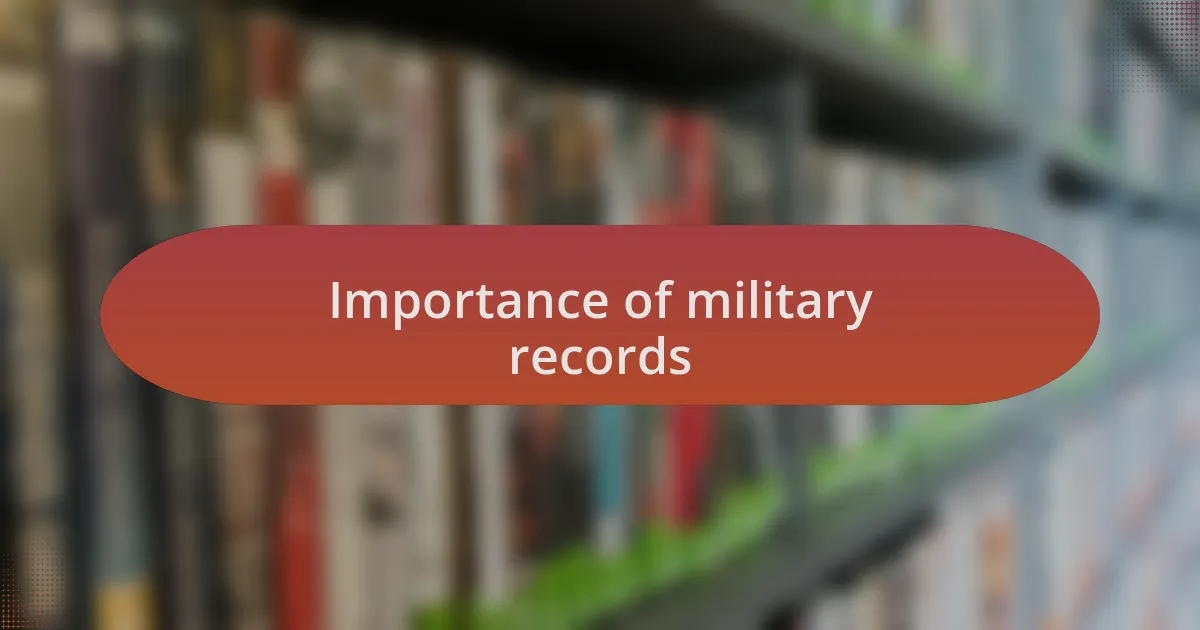
Importance of military records
Military records are invaluable for uncovering the intricate details of family heritage. When I stumbled upon my great-uncle’s service record, I was amazed to discover not just his rank but also the battles he fought in and the commendations he earned. Each entry brought to light a rich tapestry of experiences that reshaped my understanding of my family’s legacy. Have you ever found a record that made you feel a deeper connection to your ancestry?
The emotional impact of these documents goes beyond mere data; they encapsulate the bravery and sacrifices made by those who served. For example, while examining discharge papers, I encountered handwritten notes that revealed a soldier’s struggle to readjust to civilian life post-war. This insight compelled me to consider how many veterans faced similar challenges, and it reminded me of the human stories behind the uniform. Isn’t it poignant to think about how historical records translate into personal narratives?
Furthermore, accessing military records can serve as a catalyst for family conversations about service and sacrifice. I recall a dinner where I shared findings about my grandfather’s experience in World War II, sparking a lively discussion that sparked a sense of pride and reflection among family members. As everyone shared their thoughts, it became clear how these stories connect us across generations and foster a greater appreciation of our shared history. What stories lie waiting in your family’s past that could inspire similar conversations?
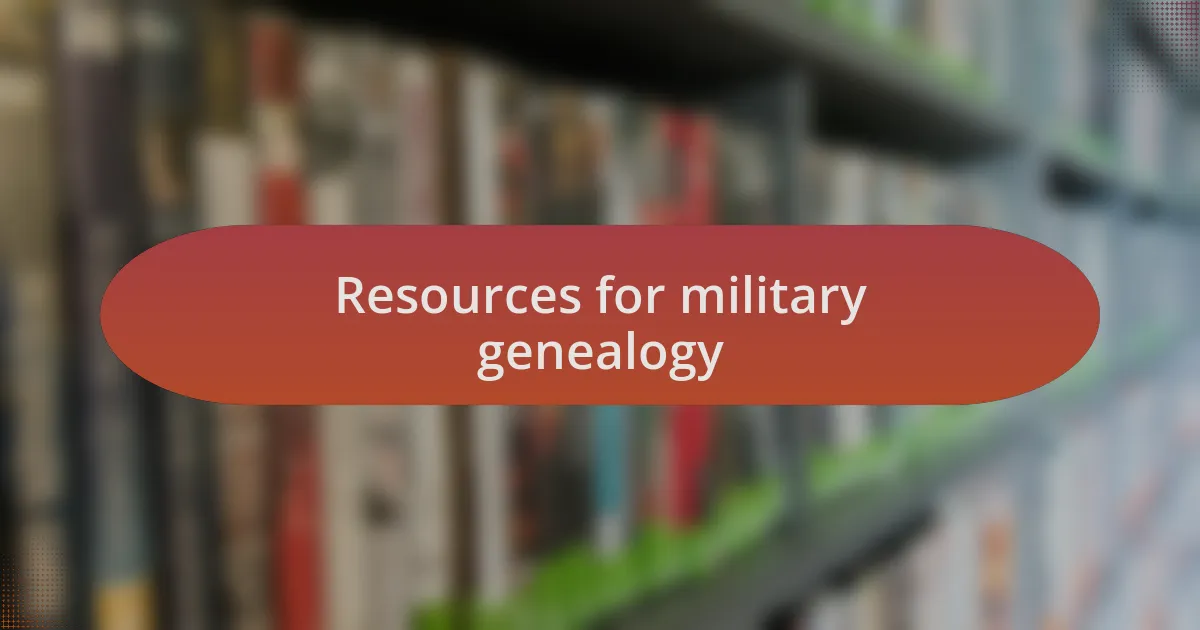
Resources for military genealogy
Many resources are available for diving into your family’s military genealogy. I found that starting with online databases, such as Ancestry.com or Fold3, was incredibly helpful. These platforms offer access to a wealth of records, including service files, pension applications, and even draft cards. Have you explored something similar in your research?
Visiting local libraries or archives can also yield surprising results. I remember a trip to a nearby county library where I uncovered microfilm records of newspaper clippings detailing local soldiers’ heroics during World War I. The articles not only highlighted their bravery but also gave me context about the community they represented. Isn’t it remarkable how such local history can weave together with your family tree?
Additionally, connecting with veterans’ organizations can provide insight and resources you might not find elsewhere. During my search, I reached out to a local VFW post, where passionate members shared stories and even offered assistance in locating service records. It made me realize how welcoming these communities can be, encouraging us to keep our family’s history alive. What connections can you make in your own community to learn more?
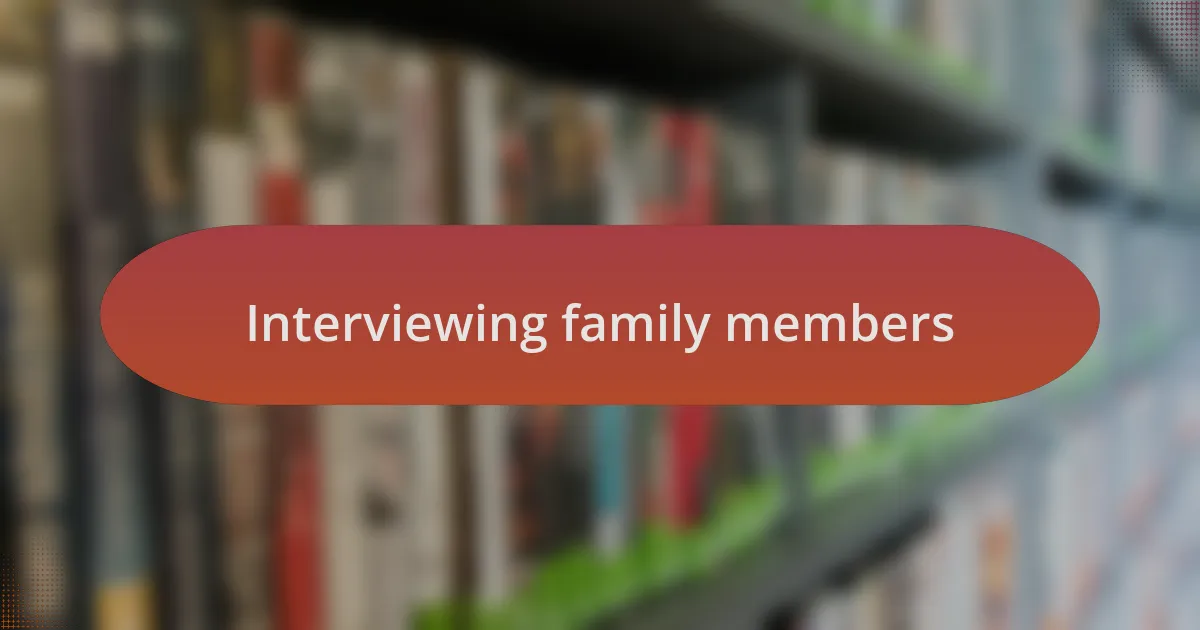
Interviewing family members
One of the most rewarding steps in my research was interviewing family members. I remember sitting down with my grandmother, who shared vivid stories of my great-grandfather’s service during World War II. Hearing her voice as she recounted his bravery and resilience added a deeply personal layer to the dry facts I found online. Have you considered how these anecdotes can breathe life into your family’s military history?
I approached each interview with open-ended questions, allowing my relatives to share memories and experiences that might not be documented anywhere else. For instance, my uncle recalled the camaraderie among soldiers, illustrating the bonds formed in the heat of battle. His emotional reflections made me appreciate not just the historical timeline, but the human stories woven throughout these events. What memories do your family members hold that could enrich your research?
Listening to their experiences often led to unexpected revelations. I was surprised to learn that my own father had nearly enlisted during Vietnam but chose a different path at the last moment. This candid moment sparked a deeper conversation about choices and sacrifices that shaped our family. Have you thought about how these personal histories intersect with broader military narratives?
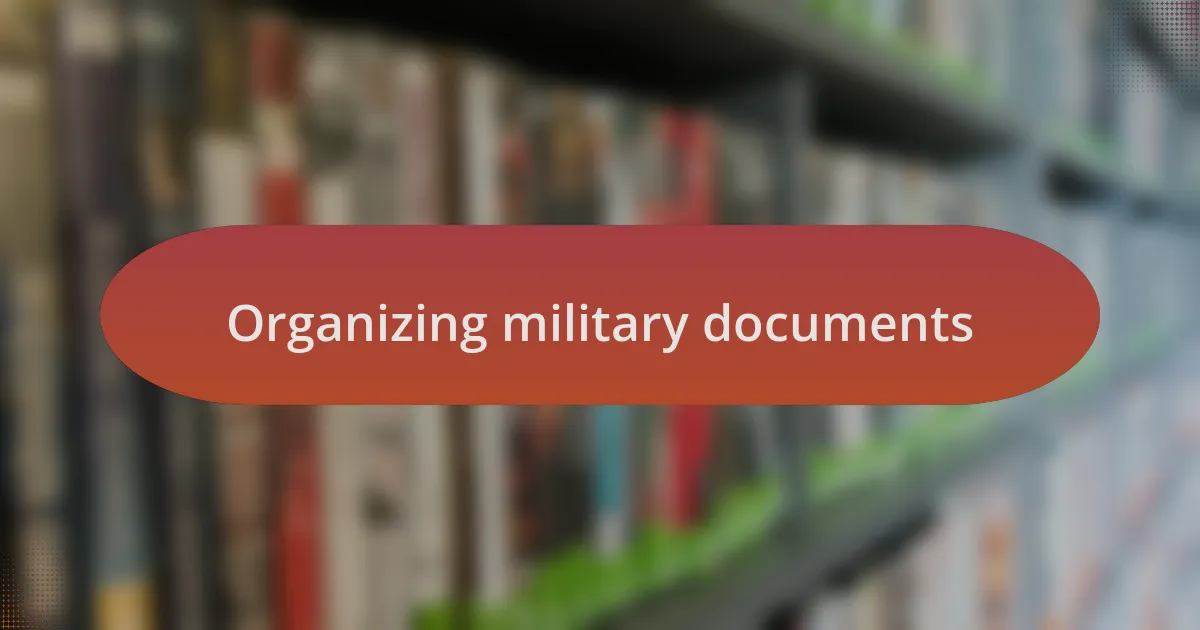
Organizing military documents
Organizing military documents can often feel like a daunting task, but I found that creating a system tailored to my needs made all the difference. I decided to categorize documents by family member and event, using binders and labeled folders. This way, I could easily locate my great-uncle’s service records from the Korean War or my grandfather’s discharge papers—each piece telling a unique part of our family’s story.
During the process, I stumbled upon my grandfather’s Navy discharge certificate and a collection of letters he wrote home. They were a window into his experiences at sea, revealing not just military details, but also his hopes and fears during deployment. How did I feel when I realized these letters were more than just correspondence? It was like connecting with a part of him that transcended generations—a bittersweet reminder of the personal sacrifices he made.
I also found it crucial to digitize important documents. I scanned everything to ensure their preservation, safeguarding them against time’s inevitable wear. This step helped me share my discoveries easily with family members who might not have access to the physical copies. Reflecting on this, it prompted me to think about what I might uncover next—are there more hidden treasures waiting in family attics that could further illuminate our past?
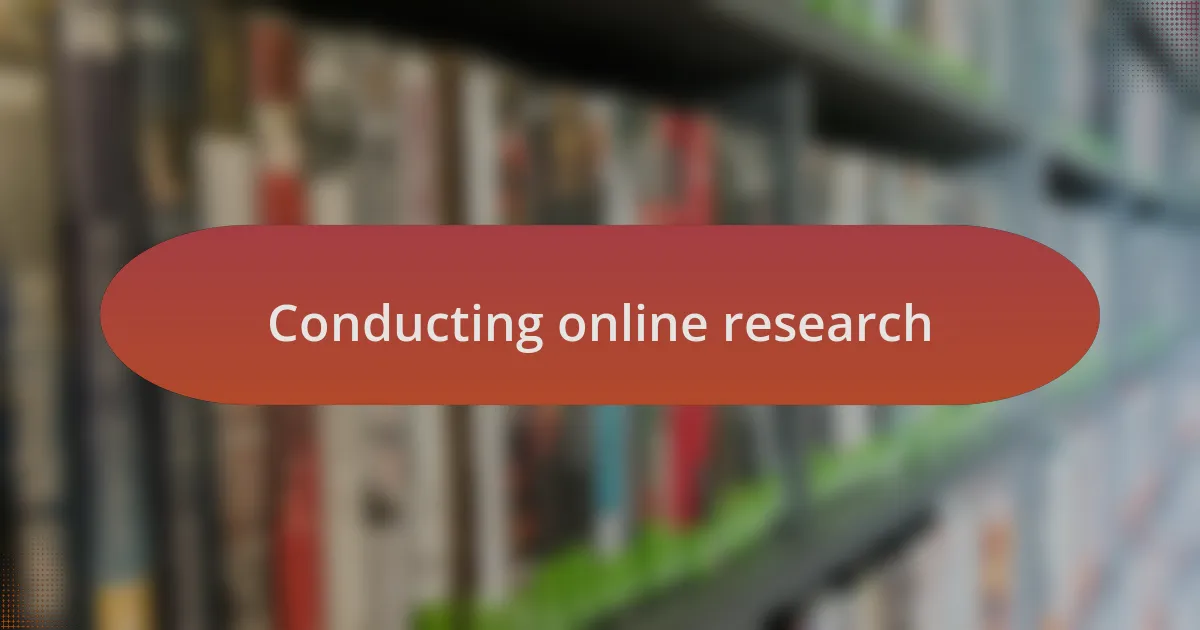
Conducting online research
Conducting online research became an exciting adventure for me as I explored the digital archives and genealogy websites. I would often spend hours searching for military records, guided by a mix of curiosity and determination. Each successful find, like locating my great-grandfather’s enlistment record, felt like uncovering a piece of a puzzle that had been scattered across time.
I remember the moment I logged into a website dedicated to military history and came across a digitized unit history for my grandfather’s battalion. I couldn’t believe my eyes when I read about their deployment and the battles they faced. It wasn’t just names on a screen; it was a vivid account of bravery that made me appreciate the sacrifices my family made. Have you ever experienced that rush of connection when uncovering a story behind a name? It’s an exhilarating reminder of the legacy we carry.
As I delved deeper into online research, I learned the importance of utilizing multiple sources. I not only relied on official military databases but also explored social media groups dedicated to military history. Through these platforms, I connected with distant relatives who shared their own findings. It’s fascinating how a simple post can lead to unexpected connections—each comment could potentially unlock another chapter of your family’s military saga. Have you ever thought about how your search might lead to a newfound kinship with strangers? It’s a beautiful aspect of genealogy that reminds us we are all part of a larger narrative.
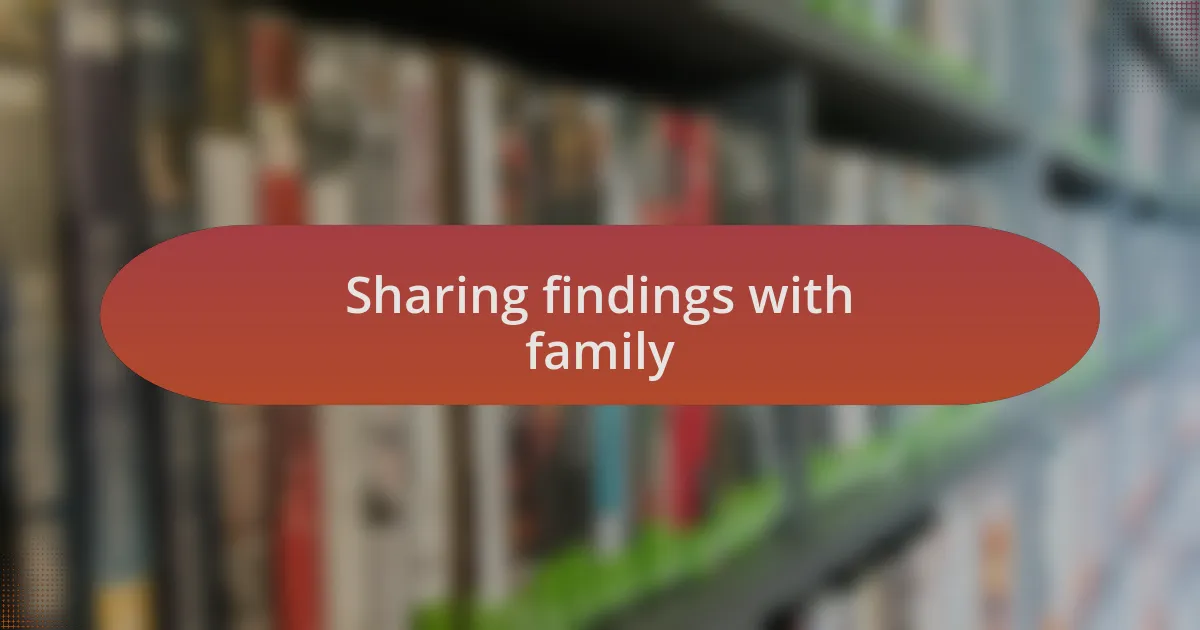
Sharing findings with family
Sharing my findings with family was one of the most rewarding experiences in my research journey. After uncovering a trove of stories about my great-uncle’s service in World War II, I organized a family gathering to share what I had learned. Seeing their faces light up as I passed around printed photos and medals was incredibly fulfilling; it felt like I was breathing life into history, connecting my relatives to a legacy they hadn’t fully grasped before.
During another family dinner, I shared insights from my research about my grandfather’s incredible bravery. As I spoke about his contributions, I noticed my younger cousin’s eyes widen with pride. It struck me how important it is to pass down these stories, reminding each generation of the values that shaped us. Have you ever held a conversation where you felt the weight of history coursing through the air? It’s a powerful challenge to keep these stories alive, yet it energizes our family bonds.
I also began creating a digital slideshow to share my findings. Incorporating maps of where my ancestors had served alongside their stories made the connections even more tangible. As I presented it to my family, I could see my mother tearing up, and it dawned on me: sharing military history isn’t just about facts; it’s about emotions, pride, and the unbroken thread of our family story. Have you ever thought about how just a few shared memories can heal wounds or bridge divides? Connecting through our past can transform our understanding of who we are today.